Challenges and Potentials for Europe
"Intergenerational Futures"

- area of research: humanities, cultural and social sciences (lead); natural, life, data and technological sciences possible
- type of funding: international research projects and summer schools
- up to 1 million EUR for 3 partners, up to 1.2 million EUR for 4 partners, up to 1.5 million EUR for 5 partners
- up to 4 years
- research teams working on demographic change in Europe
- consortia involving 3-5 principal investigators from at least 3 different European countries (main applicant has to be a member of a German university/research institution; max. 2 PIs from the same country)
- additional benefits: funding for communication of science and research; funding for the preparation and storage of research data (data reuse)
Deadline: December 14, 2022 (intl. research projects)
Deadline: December 01, 2022 (summer schools)
An increasingly older population presents both diverse challenges and opportunities (…) at the individual, societal and economic level as well as between generations." (Dubravka Šuica, Vice-President of the European Commission, Democracy and Demography). The European population is expected to shrink over the next years due to relatively low fertility rates and a rising median age of population. This influences the lives of older generations, but also changes the living environment and experience of the younger generation in Europe. Still, this situation does not have to be a negative occurrence, but can also carry potential. To reap this potential, it is useful to develop utopian visions for Europe - and to answer the questions "In what kind of society do we want live?"
To cause a positive transformation of European societies, fresh perspectives are needed. Therefore, research that crosses physical, disciplinary and methodological boundaries is encouraged in this call. Solution-finding approaches from the humanities, cultural and social sciences are often overlooked for overcoming intergenerational challenges but can be crucial. Combining these with expertise from the life sciences and technological sciences might further open new ways for positive developments.
Scope of Funding
Intl. Research Projects
The call targets scholars in the humanities, social and cultural sciences, as these fields are often still missing in research on demographic change. Where appropriate, interdisciplinary co-operations with partners from the life, data, technological and natural sciences are appreciated. Funding can be provided for the constitution of European research groups comprising up to five principal investigators (PIs) from at least three different European countries. The main applicant needs to be affiliated with a German university or research institution. A collaboration with researchers from Southern and Eastern Europe is particularly desirable. The scientific qualification of young scholars has to be a central element of each research project.
Please find details of requirements and the application procedure in the Information for Applicants 111b (pdf). Applications must be submitted via the electronic application system of the Volkswagen Foundation.
Summer Schools
Funding is available for summer schools that aim to equip selected young academics (particularly doctoral candidates but also post-doctoral researchers) with new insights and knowledge on the broad field of "Challenges for Europe". Participants from at least three different European countries should be involved. Interdisciplinary approaches are appreciated.
Please find further information in the Information for Applicants 111a (pdf). Applications must be submitted via the electronic application system of the Volkswagen Foundation.
Online consultation
You want to apply? On Oct. 20, 2022 at 9 a.m., Dr. Annabella Hüfler-Fick will be happy to answer your questions. Registration is not necessary, please participate via the following access link (Zoom) https://us02web.zoom.us/j/82287461913?pwd=SEMySmgvUGRUWDNhREpUYzJZWWV2dz09.
Background
The funding initiative Challenges (and Potentials) for Europe" was established in 2017 and is now part of the profile area 'Societal Transformations'. In this profile area, the Volkswagen Foundation supports research that addresses diverse aspects of transformation processes. It encourages cross-border and multi-perspective approaches and aims to open up new ways of contributing toward shaping societal transformations.
